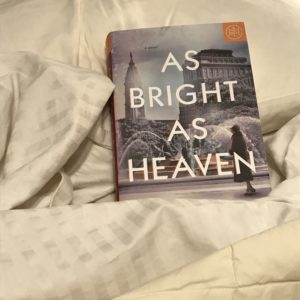Death comes for us all in one way or another. It is a certainty. Our lives will one day end, and most of us never know when. Interestingly enough, it is our mortality that gives our existence its value and beauty. If our days were not numbered, we probably wouldn’t care how we spent them. How does this knowledge that we are mortal affect our choices? The risks we take? The risks we don’t?
Synopsis
As Bright as Heaven goes back and forth in its narrators, moving between the perspectives of Pauline Bright and her three daughters. The events of the book span eight years during which each of the girls grows up—both by the simple circumstance of time passing as well as the events of life—including the Great War and the Spanish Flu—that force them to mature more quickly than they might have otherwise.
When the book opens, Pauline has just lost her infant son, brother to fifteen year-old Evie, twelve year-old Maggie, and six year-old Willa. Following on the heels of this intensely personal experience of Death comes an invitation to move to Philadelphia, for Pauline’s husband Thomas to learn the business of and take over his bachelor Uncle Fred’s mortuary. As Thomas and Pauline learn the business and experience the respect and, at times, gentleness of Death, the Spanish Flu arrives in Philadelphia, delivering a parentless baby boy into their arms. After the waves of flu and war recede, the Bright family is left amidst the ruins of a beleaguered and half-emptied city, looking different than they did when they arrived and struggling with what it means to move on with a new composition of family.
 Timing
Timing
The joke may be getting a little tired now, with my having made it a few times on Instagram, but my timing in reading As Bright As Heaven (and, arguably, Berkley’s timing in publishing it) was not ideal. It’s a lovely book…to read any other time than flu season. I started carrying hand sanitizer and became wary of touching surfaces in public spaces. Although, my partner caught the flu shortly after I finished this book and I didn’t, so perhaps I have Meissner to thank for my health this year.
Admittedly, I was also a touch trepidatious about using a Book of the Month credit on As Bright As Heaven. I liked but didn’t love Meissner’s last book, A Bridge Across the Ocean. My bookshelves are nearly full so I only keep books I love enough to share or to reread, which extends to trying to buy only those physical books I think will merit the shelf space. Thankfully, As Bright As Heaven is a book worth keeping.
Characters
One of the main reasons I think I was able to get into Bright more than Bridge is that I could connect to the characters far more. I was never able to really identify with the women in Bridge and so never got past the feeling of watching someone else’s life from the outside. That disconnect also likely colored my reaction to how the story resolved—since I couldn’t connect, I wasn’t as invested in their endings. With Bright, Meissner created four distinct female characters, each of whom had a trait or traits I was able to identify with. Though it is hard to pick, I loved Evie most for her bookishness, her seriousness, and her choices that ultimately threw convention entirely out the window. It’s us serious rule-followers who, when we finally find someone or something worth throwing the rules out for entirely, can surprise you the most.
Pauline, fierce in her mothering, chose to keep Death near until its presence was a comfort rather than a scourge. Maggie, most like her mother, came into her own as she mothered little Alex, the baby found in the flu-ridden tenement. And Willa—strong-willed, lovely Willa grew up far before she should have and yet, in the acting older than her age, came to know who she really was.
Encountering History Through Fiction
As has been mentioned repeatedly, engaging historical fiction is one of my favorite genres to read. I was a history major and enjoy reading about different periods of time, yet the human element often felt like it was missing in the average history class. (This may be a good time to mention that I was the kid who skimmed ahead to figure out when we’d be reading about the Donner party in 11th grade American History and baked sugar cookie people to bring in to eat in class that day. Arguably morbid, though you can’t say I didn’t insert a human element into the class. Only the teacher really appreciated the timing, though my classmates probably enjoyed the cookies.)
While writing is always high on my list of what makes a book a quality read for me, I can sacrifice lyrical prose when the character development is spot-on and the lives of the characters compelling. Bright hits my buttons on the character development, though this isn’t to say its poorly written. I had nothing to complain about in the tone or word choice, there just weren’t paragraphs I wanted to re-read or copy into my reading journal to appreciate again.
The characters were what drew me into the story, kept me reading late, and made the terror of the Spanish flu all the more real. I had heard the numbers about the flu, had realized intellectually that it had overlapped with the Great War, but hadn’t really thought about what that would have meant to the average household. Particularly in places like Philadelphia, there were not any places that were untouched by Death in the time those two overlapped. By making me care about her characters, Meissner made this specter of Death felt more real, more terrible and terrifying.
And, revisiting my timing joke from before, perhaps this was the year to read this book. We forget that people can die from the flu—it feels like something that doesn’t really happen anymore and yet, thousands have died this year. Nothing like the Spanish Flu, of course, but enough to remember that it’s possible. To remind you that, as in As Bright As Heaven, Death is always close by, even if we are not as aware of its presence as Pauline and her daughters.
Foreshadowing
If I have any complaints, it’s that the book did become predictable at times. If there are any teachers out there looking for examples of foreshadowing, there are some rather heavy-handed examples in Bright. Though, to be fair, when the war and the flu are killing everyone, it’s hard not to see some of the death coming.
To Meissner’s credit, even the events I saw coming I didn’t want to see. I wanted to be wrong, which doesn’t happen often. There was no satisfaction here in being right.
Recommended
This is a book I would recommend for fans of historical fiction and “women’s fiction” (ugh, again, to the name of that category). I probably wouldn’t recommend this to my coworker whose reading list is drawn almost exclusively from The New York Times book review but will recommend it to my mother. If you’re a fan of relatively easy to read, plot-driven historical narratives with strong, well-developed female characters, this is a book I would recommend to you.
Notes
Published: February 6, 2018 by Berkley (@berkleypub)
Author: Susan Meissner (@soozmeissner)
Date read: January 19, 2018
Rating: 3 ½ stars

